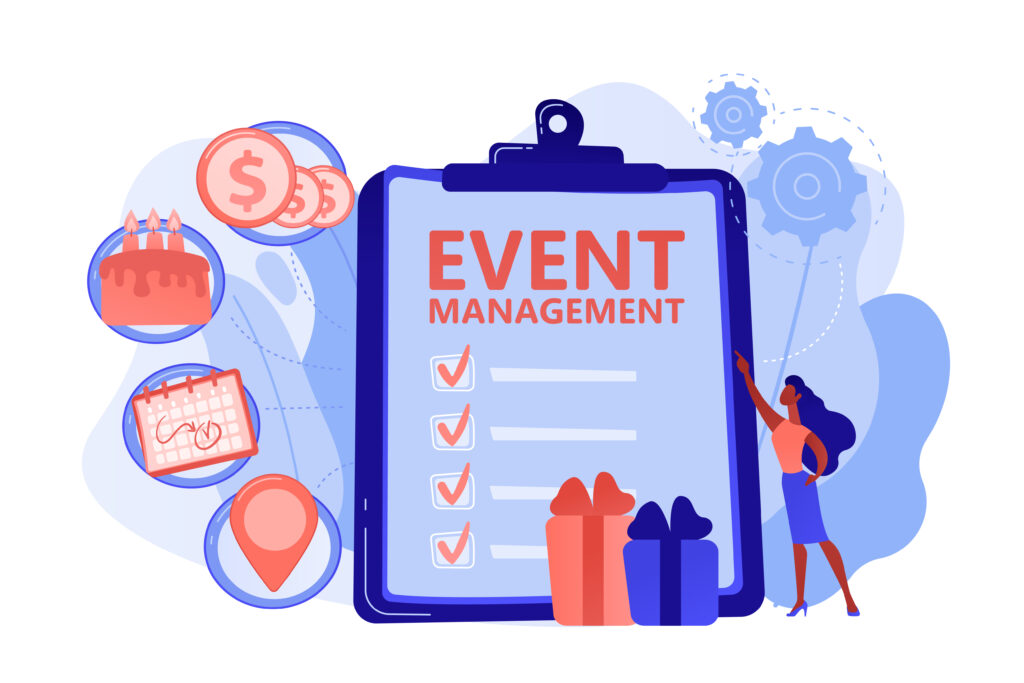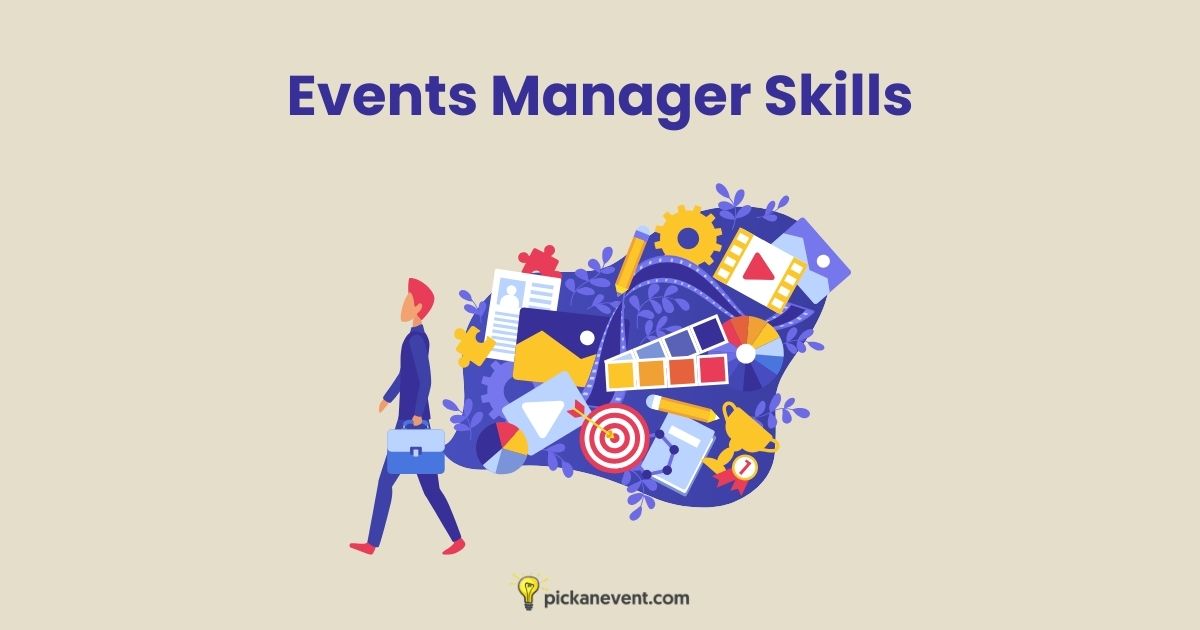What are the skills needed for an event manager? In this post, we’ll explore the essential skills for an event manager role, from seamless communication to crisis management. Let’s dive into what makes an event manager not just good but great.
Table of Contents
Skills For An Event Manager

1/ Organization and Planning
The backbone of successful event management lies in meticulous organization and planning. This involves
- Setting clear timelines for every stage of the event, from initial planning to post-event activities.
- Choosing the right venue that fits the event’s theme and attendee size is crucial. Coordination with vendors for supplies, catering, and decorations needs to be seamless.
- …
Related:
- What Is Event Planning?
- What Is Event Management
- Event Plan Examples
2/ Communication
Effective communication is about ensuring that every team member, vendor, guest, and sponsor is on the same page. Clear, concise, and timely information exchange prevents misunderstandings and keeps everything flowing smoothly. Whether it’s through meetings, emails, or calls, maintaining open lines of communication is essential.
- Example: When dealing with a last-minute change in the event schedule, the event manager effectively communicates the changes to the team, vendors, and attendees, minimizing confusion and keeping everyone informed.
3/ Problem-Solving

Things don’t always go as planned. An event manager must think quickly and find solutions when unexpected issues arise, such as weather problems, technical glitches, or last-minute changes to keep the event on track without panicking.
- Example: When a keynote speaker’s flight is delayed, the event manager quickly arranges for a substitute workshop to fill the gap in the schedule.
4/ Budget Management
A crucial aspect of event management is keeping an eye on the finances. This skill involves setting a realistic event budget, tracking expenditures, and ensuring that every dollar spent adds value to the event. It also includes negotiating with vendors to get the best rates and making cost-effective decisions that don’t compromise the quality of the event experience.
5/ Attention to Detail
The success of an event often lies in the details. This can range from the layout of name badges to the timing of speeches. An event manager with a keen eye for detail ensures that every element, no matter how small, contributes to a seamless and enjoyable experience for all attendees.
6/ Flexibility

Changes and last-minute adjustments are part of the job. Being able to quickly pivot, whether it’s altering the event layout or adjusting the schedule, helps to manage any disruptions smoothly and maintain the event’s flow.
- Example: When bad weather threatens an outdoor gala, you need to quickly adapt by moving the event indoors, rearranging the layout, and updating attendees, ensuring the event proceeds without a hitch.
7/ Leadership
Leading by example, an event manager inspires and organizes their team to achieve the event’s goals.
This involves delegating tasks effectively, motivating the team, and ensuring that everyone understands their roles and responsibilities. Good leadership fosters a positive working environment and contributes to the event’s overall success.
8/ Networking
Strong relationships with vendors, sponsors, and industry professionals can make or break an event. Networking involves cultivating these relationships over time, which can lead to better deals, exclusive opportunities, and invaluable advice and support.
9/ Creativity
Every memorable event has something unique about it. Creativity in theme development, event programming, and problem-solving can set an event apart. This might mean coming up with an innovative layout, unique entertainment options, or creative ways to engage attendees.

10/ Customer Service Orientation
For an event manager, having a strong customer service orientation is crucial. This skill is all about ensuring attendees, sponsors, and vendors feel valued and supported throughout the event. It involves understanding their needs, addressing their concerns promptly, and going the extra mile to enhance their experience.
11/ Technology Savvy
In today’s digital age, leveraging technology is essential for efficient event management. This includes using event management software for planning and coordination, social media for marketing and engagement, and audio-visual technology for enhancing the event experience. Being comfortable with these technologies can streamline processes and enhance the event’s success.
- Example: An event manager uses event management software to automate registration, track attendance, and gather feedback through surveys post-event, leveraging technology to enhance efficiency and attendee experience.
Tips To Improve Skills For An Event Manager
Improving skills for an event manager requires ongoing effort. Here are concise tips for enhancing these skills:
- Seek Feedback: Collect insights from attendees, clients, and your team post-event to identify strengths and areas for improvement.
- Educate Yourself: Stay updated with industry trends and skills through workshops, webinars, and courses on topics like digital marketing or negotiation.
- Network Industry Professionals: Join industry associations and participate in forums and meetups to connect with peers, discover new resources, and find collaboration opportunities.
- Boost Creativity: Look for inspiration beyond the event industry and engage in creative brainstorming to design unique and memorable events.
- Adaptability: Be open to changes and quick to adjust strategies, preparing for various scenarios to handle unexpected challenges efficiently.
- Work on Your Leadership Skills: Lead by example and seek opportunities to mentor others. Invest time in team-building activities and clearly communicate your vision and expectations.
Conclusion
Being a successful event manager requires a mix of hard and soft skills, from organizational prowess and technological fluency to exceptional communication and creativity. Whether you’re just starting out or looking to refine your expertise, focusing on these skills for an event manager will help you navigate the complexities of event management with confidence and professionalism.
More tips and advice about events? Pick an event that you’re concerned with, and we’ll help you!
FAQs About Skills For An Event Manager Role
What skills should event managers have?
Skills Event Managers Should Have:
Organization and Planning
Communication
Problem-Solving
Budget Management
Attention to Detail
Flexibility
Leadership
Networking
Creativity
Customer Service Orientation
Technology Savvy
What are the qualities of a good event manager?
A good event manager is:
Organized: They can juggle tasks, timelines, and budgets.
Flexible: They can adapt to unexpected changes and last-minute hiccups.
Creative: They can come up with unique ideas to make the event memorable.
Communicative: They can clearly and effectively convey information to vendors, staff, and guests.
Passionate: They have a genuine interest in creating successful and enjoyable events.





